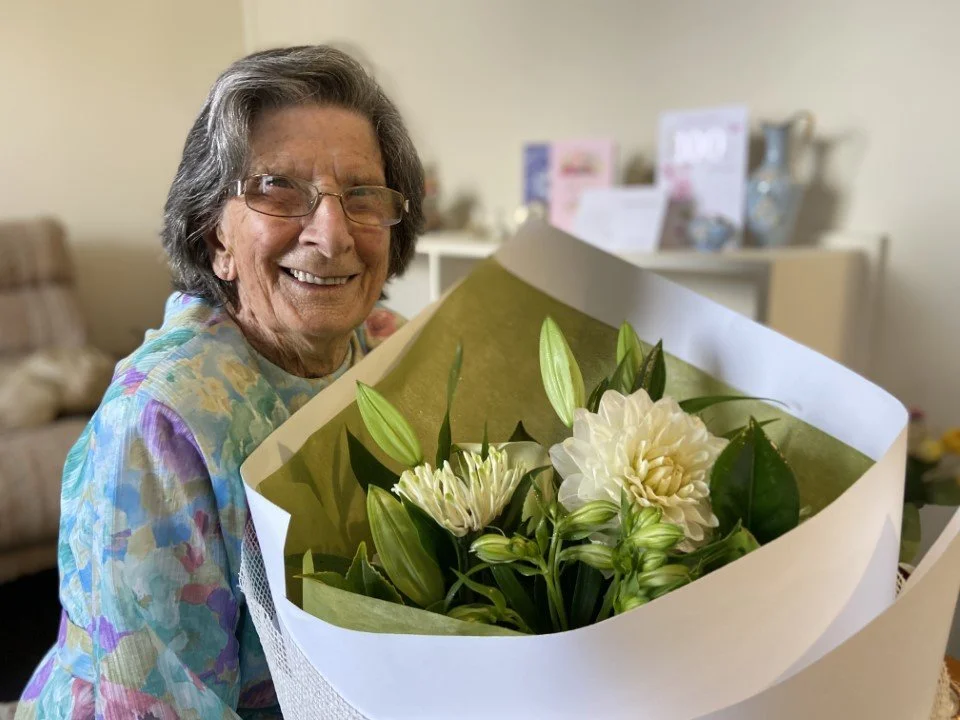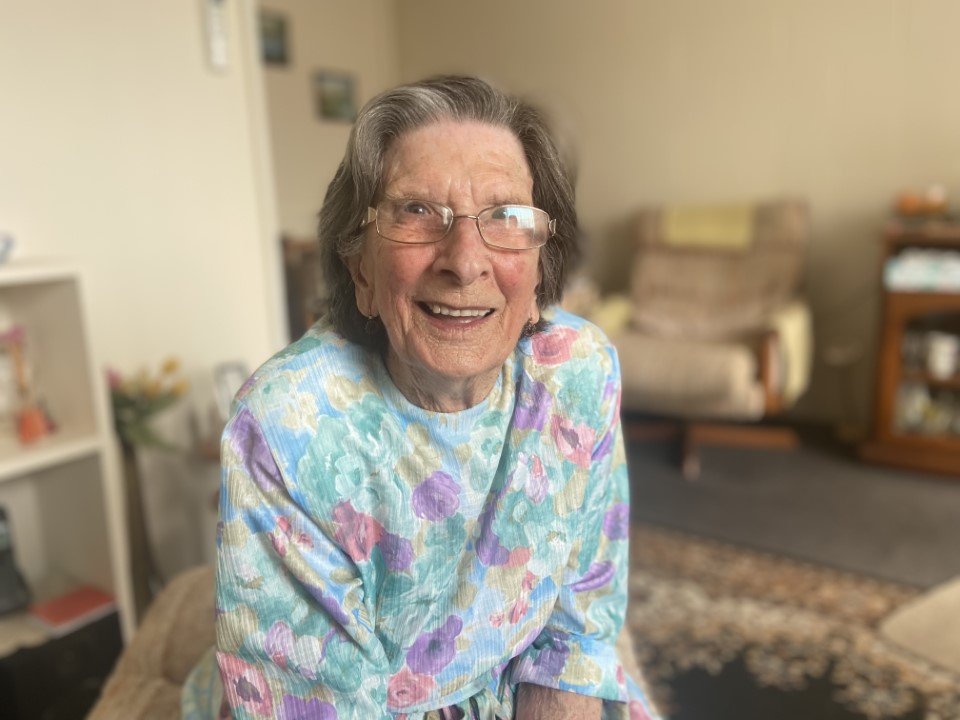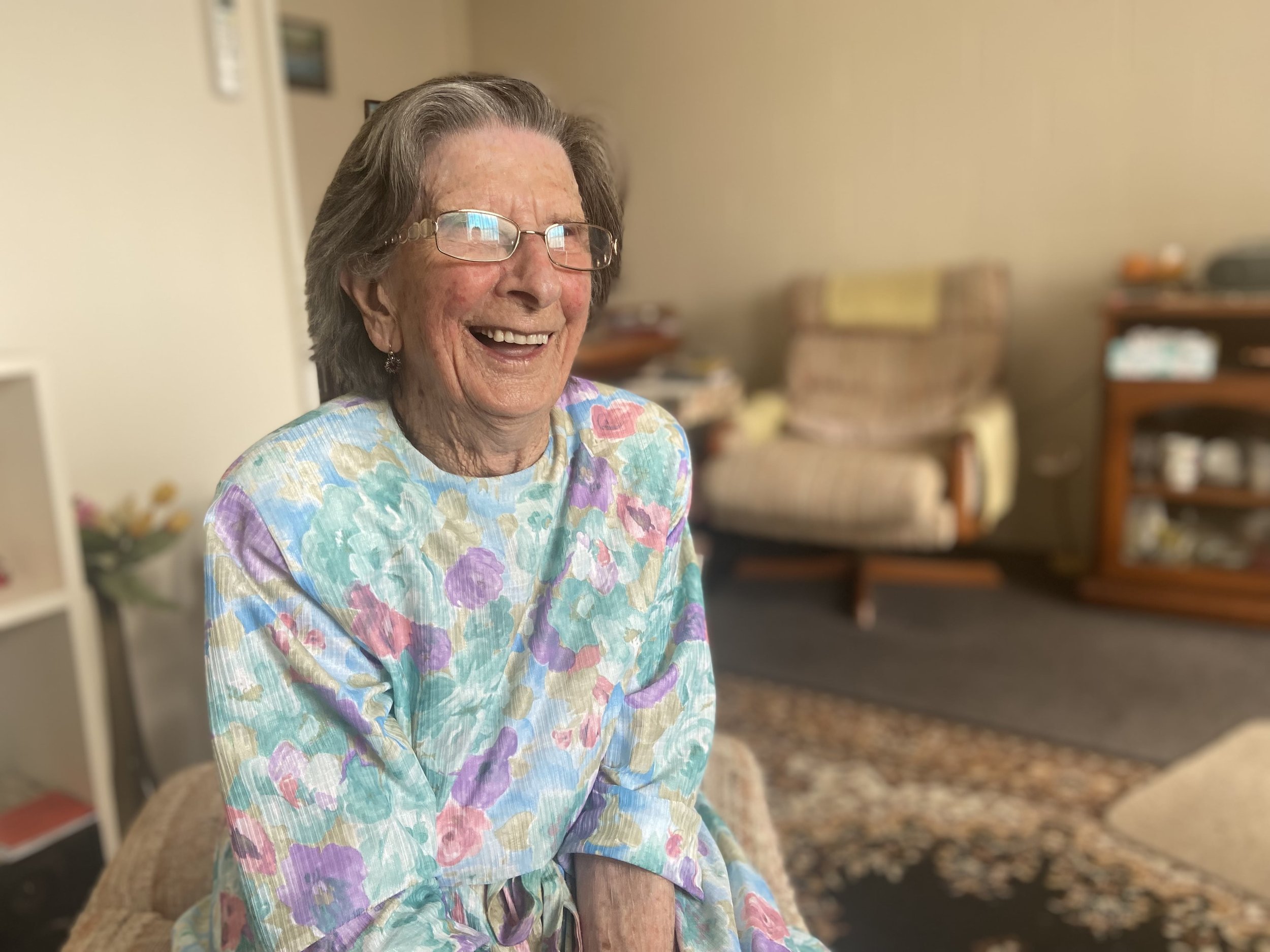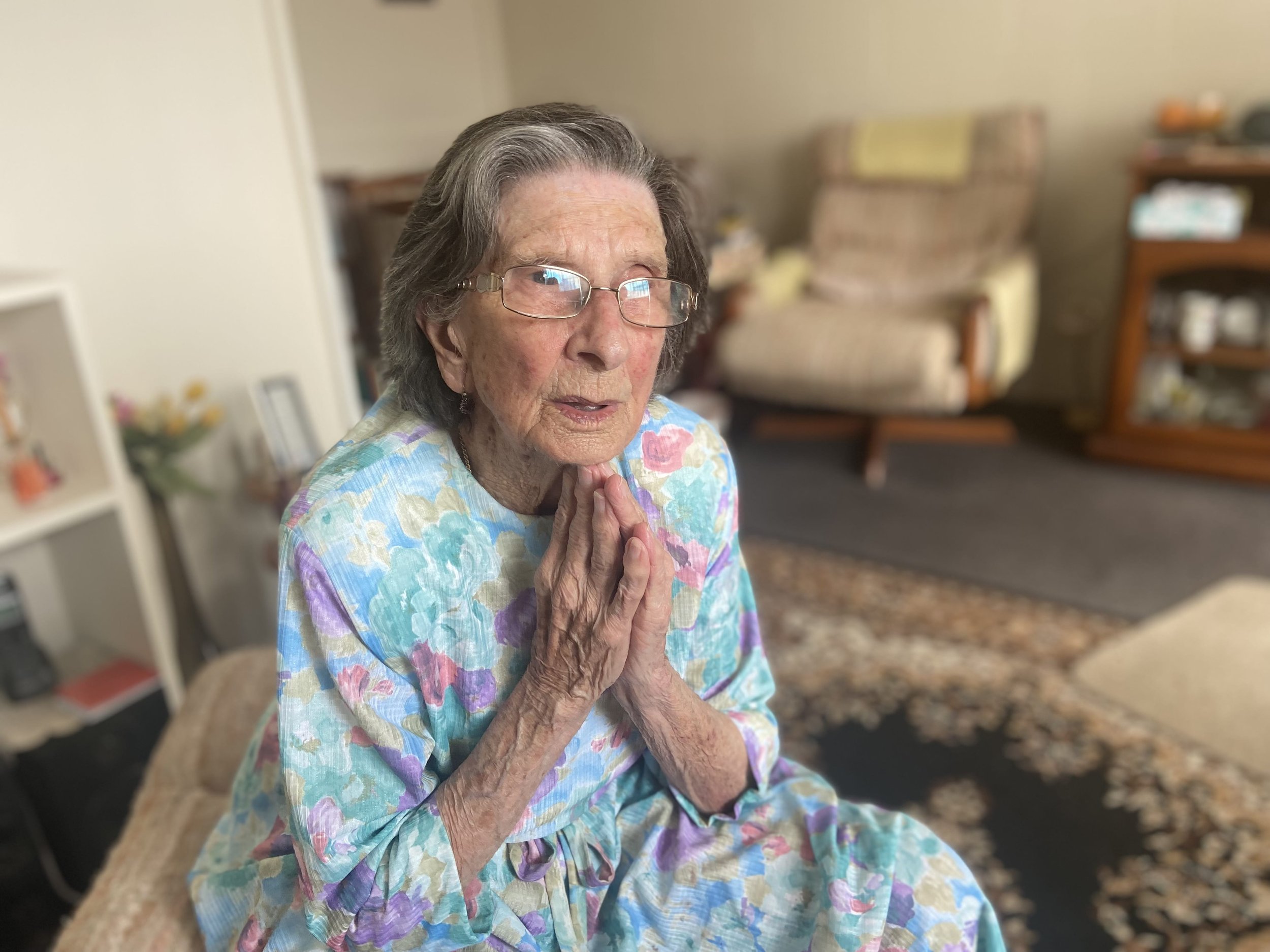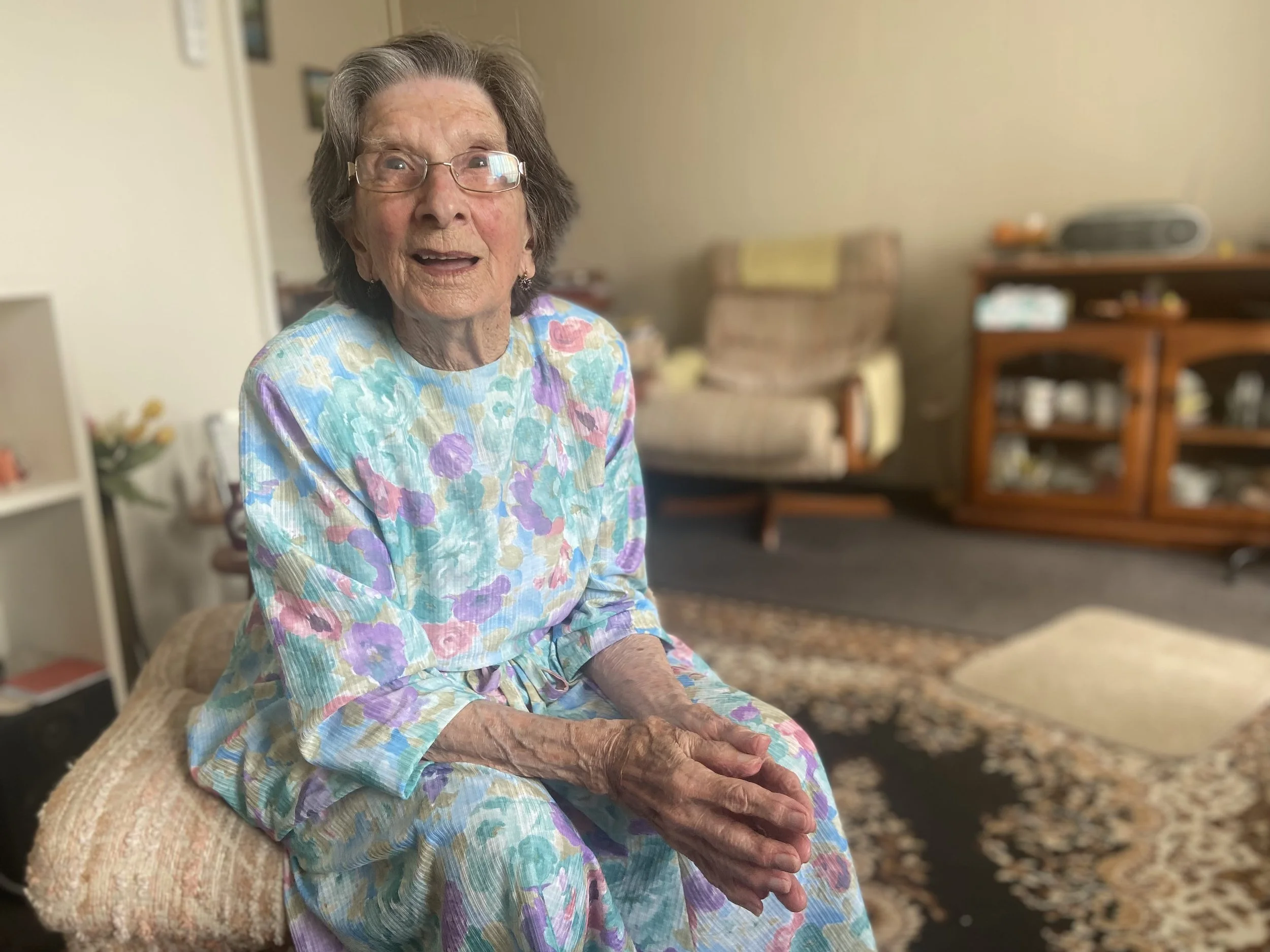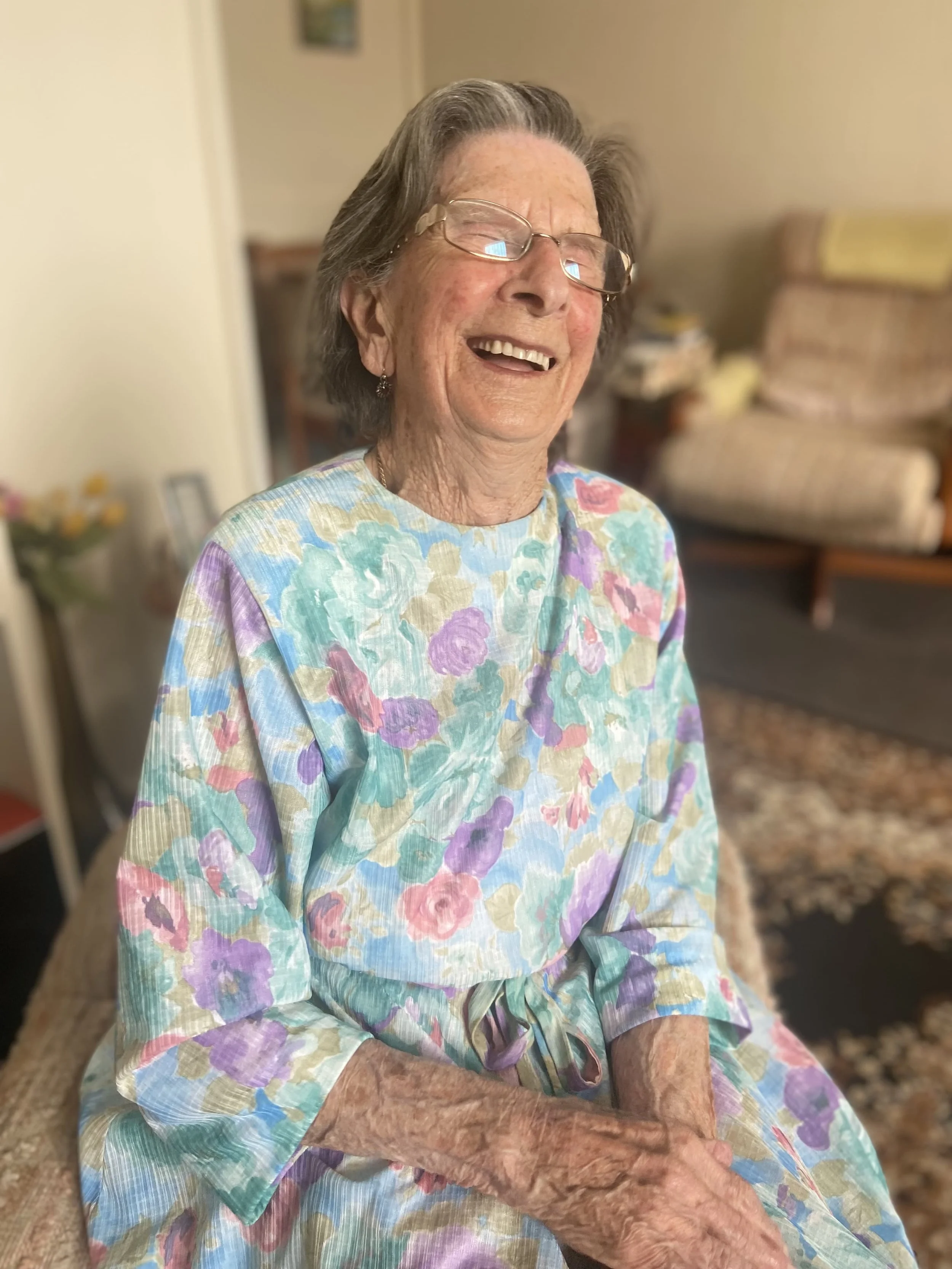Our eldest tenant turns 100
ŌCHT popped in to wish Elizabeth a happy 100th birthday – and to surprise her with this story about some of her remarkable life.
Elizabeth doesn’t want a fuss on her birthday – but she’s getting one anyway.
ŌCHT’s longest-lived tenant was born to a world before radio, where coal carts outnumbered cars and where kindness and neighbourliness were two sides of the same Georgian coin.
Elizabeth was warned to expect a fuss and a message from the King (she already had a birthday card from the Mayor) but she says she’ll take it all in her stride before her welcome return to normality the next day, the 36526th since her birth.
“People ask me what it’s like, being the age I am,” Elizabeth says with a slightly puzzled expression as she’s interviewed in her carefully tended, one-bedroom home.
“I thank my father and mother and the good Lord every day for my health and strength to reach my age but to me, my birthday will be just any other day, just another year.”
It’s an over-rated milestone, Elizabeth says, but it also means she has plenty to look back on when she’s next asked how a life well-lived becomes a long-lived life.
Early life
Elizabeth’s hundredth year is also the hundredth anniversary of parents Anges and David welcoming the second of what would eventually be 10 daughters into their young family.
The Scottish emigrees lived in Millerton, a rugged hilltop coal mining town in northern Buller. David worked in the Millerton Mine, at the time the largest underground mine in the country.
Elizabeth was born in a town of about 700 people that was nonetheless groaning under the strain of a housing shortage as migrants from the Old Country arrived to dig coal from the hills.
There was unrest at the pit, too. Labour unions – especially mining unions – were growing as were the number of days lost to strikes as miners sought better wages and safer conditions.
It was a rugged place but according to newspaper reports when Elizabeth was born, the recent and liberal application of paint to so many houses – and one of its two pubs – showed Millerton was on the improve.
The day she was born, it was reported the Westport Coal Company would send electricity to Millerton. She’d be four years old before the wires were strung and the lights were switched on.
Elizabeth remembers her parents being at a dance (“they were great ones for dancing,” she says) one evening and being called to a neighbour’s house to wait for them to get back.
She says it sounds silly now, but back then she was a bit scared of being without her parents in a dark house “because there was electric light, but not as many lights as we have now”.
Nobody had flush toilets. “Dunny Billers” collected and empty the lavatory cans – the children were “always damn scared you’d be sitting on the loo when he’d pull open the door to get the cans”.
She says her family was poor, but she has fond memories of her mother’s soups, scones and fruit-filled dumplings – and of the porridge that meant “Bessie” and her sisters never went to school hungry.
Christmas and birthdays came and went without the gifts that are so much a part of modern celebrations.
She remembers little chocolate dolls left on the doorstep on Christmas day, a sweet treat left by who knows who for her family.
Cheeky girl
She vividly remembers her first days at Millerton School and how she didn’t like having to sit next to the principal’s daughter. She once challenged a teacher for marking what she got right, wrong.
She also remembers being strapped “top to bottom” by an over-zealous teacher (admittedly, after Bessie told her she wasn’t brave enough to strap her in front of the class). She stayed home for a few days until her father told her she needn’t worry about that teacher anymore.
That teacher was suddenly let go by the school committee. There’s every chance Elizabeth’s father, a union man and active member of community committees, had a hand in her departure.
She was “cheeky” but says she “must’ve had something in my head”: Elizabeth was Dux of her school before moving on to school in Granity and later, Westport Technical College.
“You know, it’s a shame we didn’t have a camera in those days, I’d have loved to have seen my face when I got Dux, I had no idea, they kept it a secret that I’d get it,” she says, noting she wasn’t photographed until she was in her 20s.
Throughout her school days, she played basketball (what we call netball now) against teams from Norther Buller and even remembers her dad cheering her on to win a running race and a thruppence prize.
City worker
The 1930s depression made hard times even harder. By 1934, her father was no longer on the miners’ union committee – he was active in the unemployed workers movement.
“Times were hard, and I didn’t understand all of my parents struggles. But people helped each other, they were kind, so people got by on what they had, with help.”
The family moved to Christchurch when she was about 13 and the Great Depression stepped in and stopped her schooling altogether. The family of ten (with another two on the way) needed another income.
Elizabeth was soon in work, recommended by a neighbour to a woman in Fendalton caring for her severely disabled daughter. She was paid 10 shillings a week. She didn’t keep any of it – it all helped keep her household clothed and fed.
Elizabeth enjoyed the work, but she enjoyed sewing even more. She made a dress for a friend – the next thing she knew, a neighbour recommended her to a dressmaker and a new job beckoned.
Elizabeth had a successful dressmaking business when she was approached to be a bookkeeper for a big insurance company.
She had no experience, but the company had that much faith in her that it sent her to night classes at university, encouraging her to study toward a degree in accounting.
“I look back and think how lucky I was, with no experience in an office. But they were kind people in those days, they must’ve seen I had potential.”
She decided accounting wasn’t for her, but it further opened her eyes to her own business-making potential. She’d be a “freelance” bookkeeper for decades to come.
Challenge and intrigue
Bookkeeping followed her into her sporting pursuits. She was a competitive fencer who won many regional titles; she was also the New Zealand Fencing Association treasurer in the 1950s.
In Australia and entering her 60s, Elizabeth became a competitive lawn bowler and treasurer of a state women’s bowling association. Interestingly, her father was also a good bowler and had been active in Millerton bowling committees.
She’d crossed the Tasman for a man in the early 1970s (she was married with a couple of stepdaughters) but “sitting at home all day didn’t please me, so I got tangled with the bowling clubs”.
That was a time of challenge and intrigue. She arrived at a cash-rich association in which some staff and inexplicably paid “volunteers” were ignoring many of its 690-odd clubs’ needs.
Curious and precise, Elizabeth quickly uncovered and worked hard to set right the may ways in which the association’s finances were being “incorrectly” used.
She improved the association’s long-term position when she leveraged off its significant reserves to buy its first building for offices. Even then, she had to be cheeky.
The association’s bank wouldn’t offer an attractive mortgage she Elizabeth successfully approached executives from another bank, at an association event the bank sponsored.
“I was probably a bit cunning,” Elizabeth says. “But nothing would’ve happened if I wasn’t, I suppose.”
Home beckons
She rebuffed suggestions she run for association president and worked for a time for a women’s bowling clothing business before returning to New Zealand in the early 1980s.
Elizabeth saw little point staying in Aussie. The people were a little too brash, she jokes, and her rental was $500 a week. She didn’t want to work to pay someone else’s mortgage.
“Home was calling, I suppose,” she says. Just a few years shy of retirement she bought a ladies’ and men’s fashion shop on New Brighton Road, Christchurch.
“They were good days, I sold everything there. I wasn’t timid in what I’d buy, and it was a great business in the end. Even the hairdressers next door used to get all their clothing from me.”
Retirement meant a change of pace and a change of space and Elizabeth rented her first Christchurch City Council-owned unit, at Calbourne Courts, Avondale, in December 1987.
She was there during the Canterbury earthquakes in 2010 and 2011. Her television toppled onto a chair she still uses today but she wasn’t immediately worried.
“Earthquakes didn’t bother me. It wasn’t that I was bravo or anything, I was just used to them growing up in Millerton. I didn’t realise how bad they were until later; it was so unfortunate, it was quite serious.”
The land rendered unsafe, Calbourne Courts was eventually red-zoned and its 26 residents were found new places to live. Elizabeth was 89 when she moved across town, closer to a sister.
She’s been in the same council and now ŌCHT-managed home since 2012, carefully tending her garden and maintaining an immaculate home as her milestone inched ever closer.
Not that Elizabeth is one for milestones. She was non-plused when told she’s almost certainly ŌCHT’s longest-lived tenant.
“That’s lovely, but it doesn’t worry me. It’s just another day. There’ll be a few more yet.”
But what’s the secret?
And because you’ve read to the bottom of this story, Elizabeth’s got something to tell you.
“I suppose people are always curious about the secret to a long life, aren’t they, but I don’t know what the fuss is about, and I’m afraid don’t know the answer.
“Being active probably helps, I suppose, I’ve always played sport and that might train your body to last a good while.
“Oh, and I say I’m self-medicated (she takes supplements she’s learned more about listening to talkback radio) and that seems to do the trick.
“There’s the licorice – I eat licorice every day. It’s good for the plaque on the veins – it’s lovely and it’s not doing me any harm.

